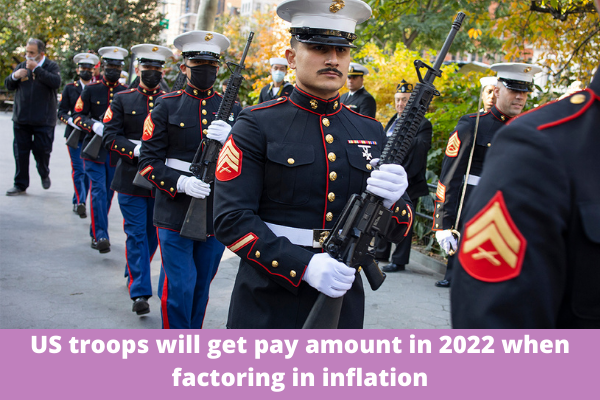When adjusted for inflation, the 2022 National Defense Authorization Act, which President Biden signed on Monday, offered a 2.7 percent pay boost for service personnel in the United States military, which amounted to a pay reduction.
The 2.7 percent increase in wages comes when costs for American consumers are rising. According to the most recent numbers from the United States Bureau of Labor Statistics, the Consumer Price Index has increased by 6.8 percent during the previous 12 months.
Price increases have been particularly severe in the items that Americans use the most, with food costs growing by 6.1 percent and fuel prices soaring by 58.1 percent over the previous 12 months, respectively.
In an interview with Fox News on Tuesday, American Enterprise Institute Senior Fellow John G. Ferrari said that the situation is difficult since “we have not seen this degree of inflation in decades.”
Must read: How To Increase Your Social Security Benefit With SSI
Ferrari, a former U.S. Army Major General who now works at the American Enterprise Institute (AEI) and specializes in defense budget analysis, said much worse for lower enlisted military members.
According to the Pentagon’s Ferrari, for troops at the bottom of the wage tier, the expense of petrol and food may push some into deeper debt, while others may become more reliant on food pantries.
Why Inflation Will Be Clinging Around In 2022
Generally speaking, the military budget is expected to suffer due to inflation, as contractors cope with supply chain challenges and increasing costs and as officials compete with enemies such as Russia and China.
According to Ferrari, “the president will need to boost military expenditure from its previously stated amount of $756 billion to around $806 billion in 2023 to account for inflation overall, or else preparedness of the force would suffer.”
A cost-of-living allowance is set to be eliminated for thousands of service members at the start of the new year. Approximately 48,000 troops stationed in the continental United States are losing the benefit, intended to offset the costs of high-priced duty locations throughout the country.
The announcement follows the Social Security Administration’s announcement of a 5.9 percent rise in payments for beneficiaries next year due to the rising cost of living, which is more than three percentage points more than the increase for military members.
Part of the problem for soldiers is how pay hikes are computed based on the Employment Cost Index from the previous year.
The ECI, which analyses increases in private-sector earnings and salaries, came in at 2.7 percent last year, the same as the military rise included in this year’s National Defense Authorization Act.
Unless Congress modifies the legislation, military pay is linked to the ECI, which means that pay hikes do not consider more recent changes in economic circumstances, such as inflation, when determining pay raises.
However, with the EPI for the third quarter standing at 4.6 percent, a greater pay boost for soldiers might be in the next year. If that is the final amount, it would be the greatest pay boost for soldiers since 2002, with a 4.6 percent pay raise.
While such a significant increase would be a start in the right direction, Ferrari feels the president might go much farther to mitigate the effect of inflation on military pay and benefits.
It is estimated that the president is formulating his 2023 budget. “If he follows the legislation in setting the rise, it will be around 4.7 percent, which is likely to be below the rate of inflation, making the actual pay decrease much worse,” Ferrari added.
“The president might recommend a greater rise, perhaps as much as 6.8 percent, to keep pace with current inflation,” the article states.
Please stay connected with us for more info and news!

